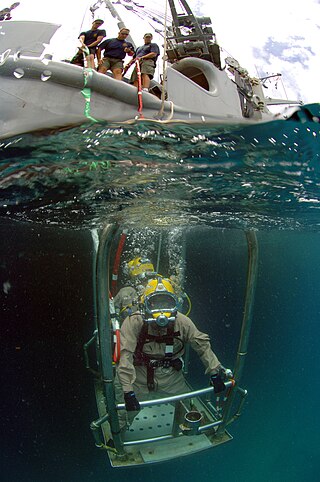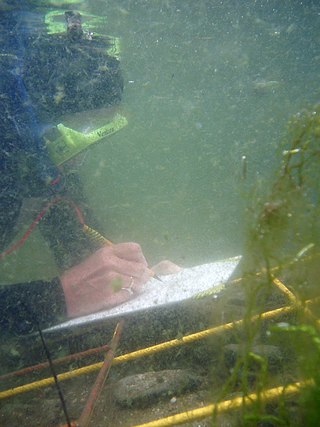France
| | This section is empty. You can help by adding to it. (January 2021) |
This list identifies the legislation governing underwater diving activities listed by region. Some legislation affects only professional diving, other may affect only recreational diving, or all diving activities. The list includes primary and delegated legislation, and international standards for the conduct of diving adopted by national states, but does not include legislation or standards relating to manufacture or testing of diving equipment.
| | This section is empty. You can help by adding to it. (January 2021) |
The government of Spain issued a royal decree taking effect on 1 July 2020 (Real Decreto 550/2020 de 2 de junio: Condiciones de Seguridad de las actividades de buceo), regulating recreational diving activities [16] [17] [18] Restrictions include:
Open water diving is underwater diving in an open water environment, where the diver has unrestricted access by way of a direct vertical ascent to the breathable air of the atmosphere. Other environmental hazards may exist which do not affect the classification. Open water diving implies that if a problem arises, the diver can directly ascend vertically to the atmosphere to breathe air, so it is also understood that, with this restriction, a staged decompression obligation is incompatible with open water diving, though it does not affect classification of the environment. This meaning is implied in the certifications titled Open Water Diver and variations thereof.

Diving activities are the things people do while diving underwater. People may dive for various reasons, both personal and professional. While a newly qualified recreational diver may dive purely for the experience of diving, most divers have some additional reason for being underwater. Recreational diving is purely for enjoyment and has several specialisations and technical disciplines to provide more scope for varied activities for which specialist training can be offered, such as cave diving, wreck diving, ice diving and deep diving. Several underwater sports are available for exercise and competition.

Recreational diving or sport diving is diving for the purpose of leisure and enjoyment, usually when using scuba equipment. The term "recreational diving" may also be used in contradistinction to "technical diving", a more demanding aspect of recreational diving which requires more training and experience to develop the competence to reliably manage more complex equipment in the more hazardous conditions associated with the disciplines. Breath-hold diving for recreation also fits into the broader scope of the term, but this article covers the commonly used meaning of scuba diving for recreational purposes, where the diver is not constrained from making a direct near-vertical ascent to the surface at any point during the dive, and risk is considered low.

Professional diving is underwater diving where the divers are paid for their work. Occupational diving has a similar meaning and applications. The procedures are often regulated by legislation and codes of practice as it is an inherently hazardous occupation and the diver works as a member of a team. Due to the dangerous nature of some professional diving operations, specialized equipment such as an on-site hyperbaric chamber and diver-to-surface communication system is often required by law, and the mode of diving for some applications may be regulated.

Commercial diving may be considered an application of professional diving where the diver engages in underwater work for industrial, construction, engineering, maintenance or other commercial purposes which are similar to work done out of the water, and where the diving is usually secondary to the work.

Underwater diving, as a human activity, is the practice of descending below the water's surface to interact with the environment. It is also often referred to as diving, an ambiguous term with several possible meanings, depending on context. Immersion in water and exposure to high ambient pressure have physiological effects that limit the depths and duration possible in ambient pressure diving. Humans are not physiologically and anatomically well-adapted to the environmental conditions of diving, and various equipment has been developed to extend the depth and duration of human dives, and allow different types of work to be done.

Scientific diving is the use of underwater diving techniques by scientists to perform work underwater in the direct pursuit of scientific knowledge. The legal definition of scientific diving varies by jurisdiction. Scientific divers are normally qualified scientists first and divers second, who use diving equipment and techniques as their way to get to the location of their fieldwork. The direct observation and manipulation of marine habitats afforded to scuba-equipped scientists have transformed the marine sciences generally, and marine biology and marine chemistry in particular. Underwater archeology and geology are other examples of sciences pursued underwater. Some scientific diving is carried out by universities in support of undergraduate or postgraduate research programs, and government bodies such as the United States Environmental Protection Agency and the UK Environment Agency carry out scientific diving to recover samples of water, marine organisms and sea, lake or riverbed material to examine for signs of pollution.

Public safety diving is underwater diving conducted as part of law enforcement and fire/rescue. Public safety divers differ from recreational, scientific and commercial divers who can generally plan the date, time, and location of a dive, and dive only if the conditions are conducive to the task. Public safety divers respond to emergencies 24 hours a day, 7 days a week, and may be required to dive in the middle of the night, during inclement weather, in zero visibility "black water," or in waters polluted by chemicals and biohazards.

The diving supervisor is the professional diving team member who is directly responsible for the diving operation's safety and the management of any incidents or accidents that may occur during the operation; the supervisor is required to be available at the control point of the diving operation for the diving operation's duration, and to manage the planned dive and any contingencies that may occur. Details of competence, requirements, qualifications, registration and formal appointment differ depending on jurisdiction and relevant codes of practice. Diving supervisors are used in commercial diving, military diving, public safety diving and scientific diving operations.
The Australian Diver Accreditation Scheme (ADAS) is an international commercial and occupational diver certification scheme. It has mutual recognition arrangements with other equivalent national schemes. ADAS qualifications have international recognition.

Diver training is the set of processes through which a person learns the necessary and desirable skills to safely dive underwater within the scope of the diver training standard relevant to the specific training programme. Most diver training follows procedures and schedules laid down in the associated training standard, in a formal training programme, and includes relevant foundational knowledge of the underlying theory, including some basic physics, physiology and environmental information, practical skills training in the selection and safe use of the associated equipment in the specified underwater environment, and assessment of the required skills and knowledge deemed necessary by the certification agency to allow the newly certified diver to dive within the specified range of conditions at an acceptable level of risk. Recognition of prior learning is allowed in some training standards.

A diving instructor is a person who trains, and usually also assesses competence, of underwater divers. This includes freedivers, recreational divers including the subcategory technical divers, and professional divers which includes military, commercial, public safety and scientific divers.
Diving safety is the aspect of underwater diving operations and activities concerned with the safety of the participants. The safety of underwater diving depends on four factors: the environment, the equipment, behaviour of the individual diver and performance of the dive team. The underwater environment can impose severe physical and psychological stress on a diver, and is mostly beyond the diver's control. Equipment is used to operate underwater for anything beyond very short periods, and the reliable function of some of the equipment is critical to even short-term survival. Other equipment allows the diver to operate in relative comfort and efficiency, or to remain healthy over the longer term. The performance of the individual diver depends on learned skills, many of which are not intuitive, and the performance of the team depends on competence, communication, attention and common goals.

The following outline is provided as an overview of and topical guide to underwater diving:

Media diving is underwater diving in support of the media industries, including the practice of underwater photography and underwater cinematography outside of normal recreational interests. Media diving is often carried out in support of television documentaries, such as the BBC series Planet Earth or movies, with feature films such as Titanic and The Perfect Storm featuring underwater photography or footage. Media divers are normally highly skilled camera operators who use diving as a method to reach their workplace, although some underwater photographers start as recreational divers and move on to make a living from their hobby.
Diving regulations are the stipulations of the delegated legislation regarding the practice of underwater diving. They apply within the national territory and territorial waters of a country. In most cases they apply to occupational diving, but in a few cases also to recreational diving. There are exemptions for recreational diving in some cases where it is recognised as a self-regulated industry. Offshore diving is generally outside the scope of diving regulations, and tends to be self-regulated through voluntary membership of industry organisations.

A diving team is a group of people who work together to conduct a diving operation. A characteristic of professional diving is the specification for minimum personnel for the diving support team. This typically specifies the minimum number of support team members and their appointed responsibilities in the team based on the circumstances and mode of diving, and the minimum qualifications for specified members of the diving support team. The minimum team requirements may be specified by regulation or code of practice. Some specific appointments within a professional dive team have defined competences and registration may be required.
A dive briefing or pre-dive briefing is a meeting of the diving team or dive group before the dive to allow the instructor, supervisor, dive leader or dive boat skipper to inform the attendees of the dive plan, contingency plans and emergency plans for the dive. The amount of detail presented should be appropriate to the dive, but there are several topics which are considered standard components of a dive briefing. The topics may vary depending on context.

The underwater diving environment, or just diving environment is the natural or artificial surroundings in which a dive is done. It is usually underwater, but professional diving is sometimes done in other liquids. Underwater diving is the human practice of voluntarily descending below the surface of the water to interact with the surroundings, for various recreational or occupational reasons, but the concept of diving also legally extends to immersion in other liquids, and exposure to other hyperbaric pressurised environments.